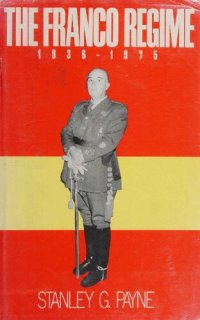
Ebook: The Franco Regime, 1936-1975
Author: Stanley G. Payne
- Genre: History
- Tags: spanish dictator, fascism, francoregime19360000payn
- Year: 1987
- Publisher: University of Wisconsin Press
- City: Madison, Wisconsin
- Edition: 1
- Language: English
- pdf
Modern Spanish history is dominated by the figure of Francisco Franco, who presided over the longest authoritarian regime of this century. Between 1936 and the end of the regime in 1975, Franco's Spain passed through several distinct phases of political, institutional, and economic development, moving from the original semi-fascist regime of 1936-1945 to become the Catholic corporatist “organic democracy” under the monarchy from 1945 to 1957. During its last major phase the regime became a politically demobilized form of bureaucratic authoritarianism that became the most economically successful “development dictatorship” in the world.
Noted historian Stanley G. Payne gives us here the definitive history of the Franco regime—the political conflict from which it emerged, its development during the Civil War, and its fundamental transformation of contemporary Spanish society. He also affords valuable insights into the “calculated ambiguity” of Franco's personal style. Aside from the crucial conservation of personal power, Payne argues, Franco never defined a formal ideology and throughout his regime used what he wanted from the ideas of others. On the other hand, he possessed a fundamental set of beliefs that changed very little during his lifetime. He believed in nationalism, central unity, Catholicism, strong authoritarian government without political parties, and a program of modern economic development determined by political and nationalistic priorities, with social reform a secondary by-product of economic growth. He was authoritarian and eclectic at the same time, a figure as formidable in its complexity as in its power. His importance to Spanish history lies not in his mere endurance in power for so long, but rather in the enormous changes that took place in Spain during his rule, some of them directly encouraged or even engineered by his regime, and others ultimately flying in the face of all that it stood for.
Although primarily writing a political history, Payne also discusses international relations and devotes two chapters to the main features of foreign social and economic policy.
Stanley G. Payne is Hilldale-Jaime Vicens Vives Professor of History at the University of Wisconsin-Madison. He is the author of a number of books on modern Spanish history, including 'Spanish Catholicism' (1984), 'Fascism: Comparison and Definition' (1980) and 'A History of Spain and Portugal' (1973), all published by the University of Wisconsin Press, as well as 'Basque Nationalism' (1975), 'The Spanish Revolution' (1970), 'Politics and the Military in Modern Spain' (1967), and 'Falange: A History of Spanish Fascism' (1961). All have been translated into Spanish.
Noted historian Stanley G. Payne gives us here the definitive history of the Franco regime—the political conflict from which it emerged, its development during the Civil War, and its fundamental transformation of contemporary Spanish society. He also affords valuable insights into the “calculated ambiguity” of Franco's personal style. Aside from the crucial conservation of personal power, Payne argues, Franco never defined a formal ideology and throughout his regime used what he wanted from the ideas of others. On the other hand, he possessed a fundamental set of beliefs that changed very little during his lifetime. He believed in nationalism, central unity, Catholicism, strong authoritarian government without political parties, and a program of modern economic development determined by political and nationalistic priorities, with social reform a secondary by-product of economic growth. He was authoritarian and eclectic at the same time, a figure as formidable in its complexity as in its power. His importance to Spanish history lies not in his mere endurance in power for so long, but rather in the enormous changes that took place in Spain during his rule, some of them directly encouraged or even engineered by his regime, and others ultimately flying in the face of all that it stood for.
Although primarily writing a political history, Payne also discusses international relations and devotes two chapters to the main features of foreign social and economic policy.
Stanley G. Payne is Hilldale-Jaime Vicens Vives Professor of History at the University of Wisconsin-Madison. He is the author of a number of books on modern Spanish history, including 'Spanish Catholicism' (1984), 'Fascism: Comparison and Definition' (1980) and 'A History of Spain and Portugal' (1973), all published by the University of Wisconsin Press, as well as 'Basque Nationalism' (1975), 'The Spanish Revolution' (1970), 'Politics and the Military in Modern Spain' (1967), and 'Falange: A History of Spanish Fascism' (1961). All have been translated into Spanish.
Download the book The Franco Regime, 1936-1975 for free or read online
Continue reading on any device:

Last viewed books
Related books
{related-news}
Comments (0)